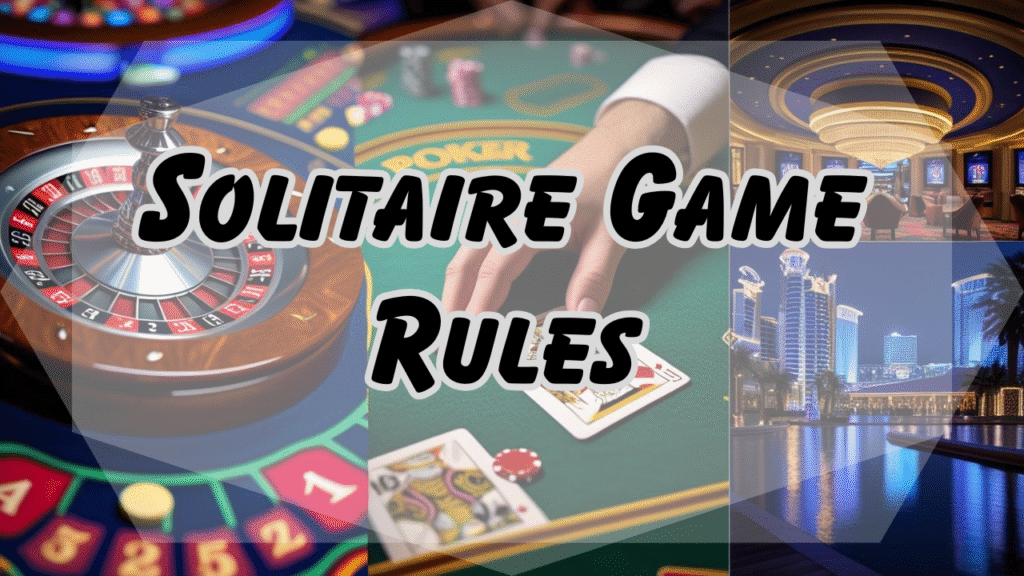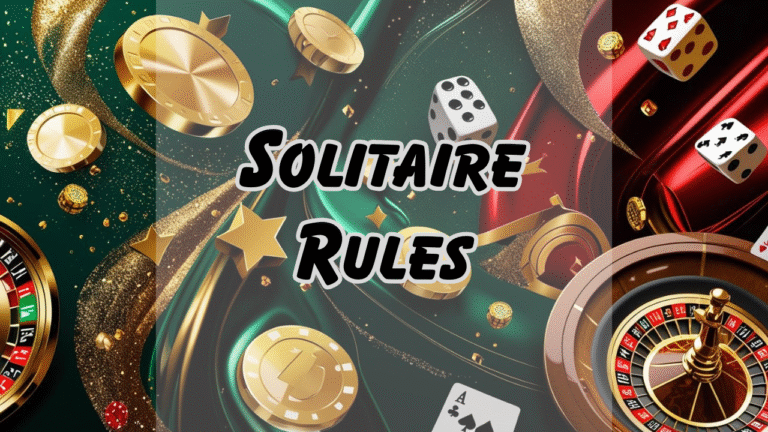Solitaire Game Rules: A brain workout encased in simplicity and strategy, solitaire is more than just a hobby. With its simple rules and relaxing thrills, solitaire has exploded in popularity since its digital heyday in the early 1990s, winning hearts all around the world. However, the first hurdle for many is still comprehending the rules of solitaire. To enjoy the game to its fullest, whether you’re just starting out or are planning to make a career out of it, you must understand these guidelines.

Learn the rules of conventional solitaire, get practical tips for playing well, and find out how playing solitaire improves your brainpower, focus, and decision-making skills in this comprehensive guide.
Learn the Rules of Solitaire for What Purpose?
Mastering solitaire’s rules entails more than just mastering the art of card shuffling. Having norms, purpose, and the opportunity to learn strategic thinking are all gifts it bestows. Seven ways in which players gain from knowing the rules:

Seven Benefits of Successfully Mastering Solitaire Rules:
- Improve Your Skills in Addressing Complex Problems: You need to plan ahead and consider all of the possible outcomes when playing solitaire.
- Memory Improvement: committing the locations of cards and potential sequences to memory improves memory retention.
- Promotes Concentration and Patience: Players are taught to be patient and wait for the correct move instead of making rash decisions.
- Reduced Anxiety: Spending time immersed in a single-task game can help you relax and unwind.
- Improving Decision-Making Skill: The constant need to make little decisions while playing the game helps hone one’s judgment.
- A sense of accomplishment and competence is fostered when one achieves victory in a game.
- Improves Self-Control: Just as important as knowing when to act is knowing when to stand still.

How Do You Play Classic Solitaire?
There is a certain pattern to traditional solitaire, sometimes known as Klondike Solitaire:
Goal: Sort all 52 cards by suit (Ace to King) and place them in one of four piles: hearts, clubs, diamonds, or spades.
Setup:
- Every one of the seven tableau heaps has a single card, every two piles have two, and every three piles have three. The top card is the only one shown in each tableau.
- Everything that isn’t already in the tableau—the played cards, the unsold ones—make up the stock.
- Discarded cards: removed from the deck.
- Each suit has four empty piles for foundations.
Action Scene:
- You can only put Kings (or a series starting with King) into empty tableau spots.
- Moving cards from one tableau to another in descending order by alternating colors (for example, putting a red 7 on a black 8).
- If it’s allowed, you can transfer cards from the stock to the tableau or foundations.
Master the Game of Solitaire in Just 5 Easy Steps
Get a Good Feel for the Layout
Look at the tableau before you move a card. Locate the face-up cards and make note of the possible moves.
Always put Twos and Aces on the Foundation.
These are the cornerstones of every successful game. Put them ahead of everyone else.
Discover Secret Decks
Start by giving more weight to actions that reveal the tableau’s face-down cards.
Ditch the Haste for Blank Tableau Columns
It should only be done early if you have a King (or sequence) that can move while maintaining momentum.
Make Efficient Use of the Stock Pile
Avoid squandering stock cards on ineffective movements. With each sketch, plan ahead a few steps.
An Analysis of Strategy: The Cognitive Benefits of Solitaire
Few people value solitaire. However, it serves as a miniature example of limited strategic planning. Tactics must be flexible because every game has its own unique setup. Solitaire, in contrast to games dependent on chance, rewards careful consideration and adaptability.
For example, research published in Frontiers in Psychology found that older people’ executive skills were improved after playing challenging solo video games. Playing solitaire can improve your brainpower and spatial reasoning because it uses rules like color coding and rank order to challenge you.
Answers to Common Questions: Solitaire Game Rules
Can one ever win at solitaire?
Answer: No. While it’s true that excellent play can win the majority of games, classic solitaire games with a random shuffling process still have an around 80% solution rate.
In order to win continuously, what is the best strategy?
Answer: Don’t construct foundations too fast, reveal hidden cards as soon as you can, and keep your tableau mobile at all times.
What is the average duration of a solitary game?
The length of a game can range from five to fifteen minutes, depending on the player’s ability and approach.
Does a game of solitaire improve one’s intelligence?
The answer is no, it does not increase IQ. However, it does enhance cognitive fitness by enhancing focus, decision-making, and memory.
Are there any differences between physical card games and their digital counterparts?
Answer: The basic principles are the same in all formats, but digital editions often have extra features like auto-move, tips, and undo that alter the challenge and learning curve.
Ending Remarks
As a discipline, solitaire goes beyond being just a card game. Mastering its rules will grant you access to a world of soothing games as well as tangible cognitive benefits. Improving one’s ability to focus, make sound decisions, or simply unwind with a little guidance can be achieved by studying and committing the solitaire game’s rules to memory.

No matter the time of day or the weather, remember that every card you move is a decision that dictates the outcome of the game—just as in real life.
Are you interested in having this blog optimized for search engines or tailored to a particular platform like WordPress or Medium?



